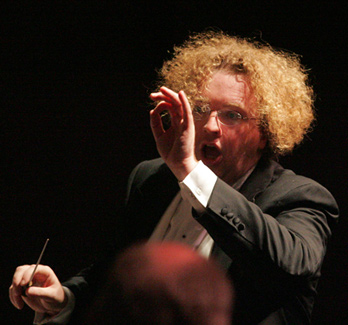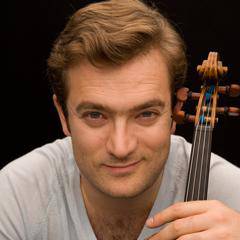Denève, New World musicians deliver powerful Honegger symphony

Stephane Deneve led the New World Symphony in music of Honegger, Prokofiev, and Mendelssohn Saturday night at New World Center.
The conductor Stéphane Denève walked on stage at New World Center Saturday night in Miami Beach and picked up a microphone, not a baton.
The first item on the New World Symphony’s program was Arthur Honegger’s Symphony No. 3, a rarely heard 1946 work that could use some explanation. Denève, chief conductor of the Stuttgart Radio Symphony Orchestra, spent several minutes detailing the work’s roots in the horrors of World War II, using the orchestra to demonstrate the themes that represented the violence of war, the stupidity of the brutish mass of people and so on.
It was an effective way to approach an unfamiliar work, and the performance that followed made an even stronger impact for the conductor’s description. The violence of the opening was particularly terrifying, with Denève conducting in a driving, almost mechanical manner that emphasized its inhumanity. The brass section did a particularly fine job, playing with depth, power and versatility, bringing to the themes of the first movement the grim swagger of the Wehrmacht marching into Paris, yet playing the healing melodies of the second movement with gentleness and warmth.
The final movement was made effective by Denève’s explanation of the deliberately idiotic theme in the bass clarinet that stands for people at their most ox-like, obedient and oppressive. It came to a shrieking crisis in the full orchestra, played as loudly as anything that has probably been heard in that hall to date. The final piccolo, violin and cello solos passages, supported by the orchestra, were all sensitively played, effectively communicating a comforting individual persistence after the symphony’s foregoing orchestral brutality.
A concert perennial followed the Honegger rarity, Mendelssohn’s Violin Concerto with the French violinist Renaud Capuçon handling the solo part.

Renaud Capuçon
Capuçon played a virtuoso’s Mendelssohn, full of fire and élan, energy and drive, but powering over some of the more intimate, vulnerable elements of the work. He brought a pulse of urgency to the first movement and played the quick passages with a sparkling tone and—aside from an occasional lapse in intonation—a sterling technique. He brought an assertive, steely tone to the delicate melody of the second movement, playing in a hurried manner that robbed it of much of its lyric effectiveness. But in the third Capuçon was back in his element, zipping through runs up and down the fingerboard with dashing confidence.
Although Prokofiev made three suites of selections from his ballet Cinderella, Denève prepared his own, intended to emphasis the most dramatic and romantic elements of the score. Under his baton, the orchestra gave a richly colored, brilliantly played performance in one of those scores that show off the orchestra at its most sensuous. There was radiant string playing throughout, but especially in the “Introduction and Amoroso,” in passages that soared in a manner evocative of the fairy tale on which they were based. The quick running melody of the Waltz was pulsing and dramatic under Denève’s baton, as he made the melody slow and accelerate in a way that suggested the growing passion of the dancers.
___________
In a leadership note, the New World Symphony has just named a new board chair, Rose Ellen Meyerhoff Greene. A member of the family for which the Baltimore Symphony Orchestra’s hall is named, she has been involved in the South Florida arts community for years, including New World, the Miami City Ballet and the Miami Arts Museum.
The program will be repeated 2 p.m. Sunday at New World Center in Miami Beach. nws.edu, 800-597-3331.
Posted in Performances
Leave a Comment
Sun Nov 11, 2012
at 12:45 pm
No Comments






